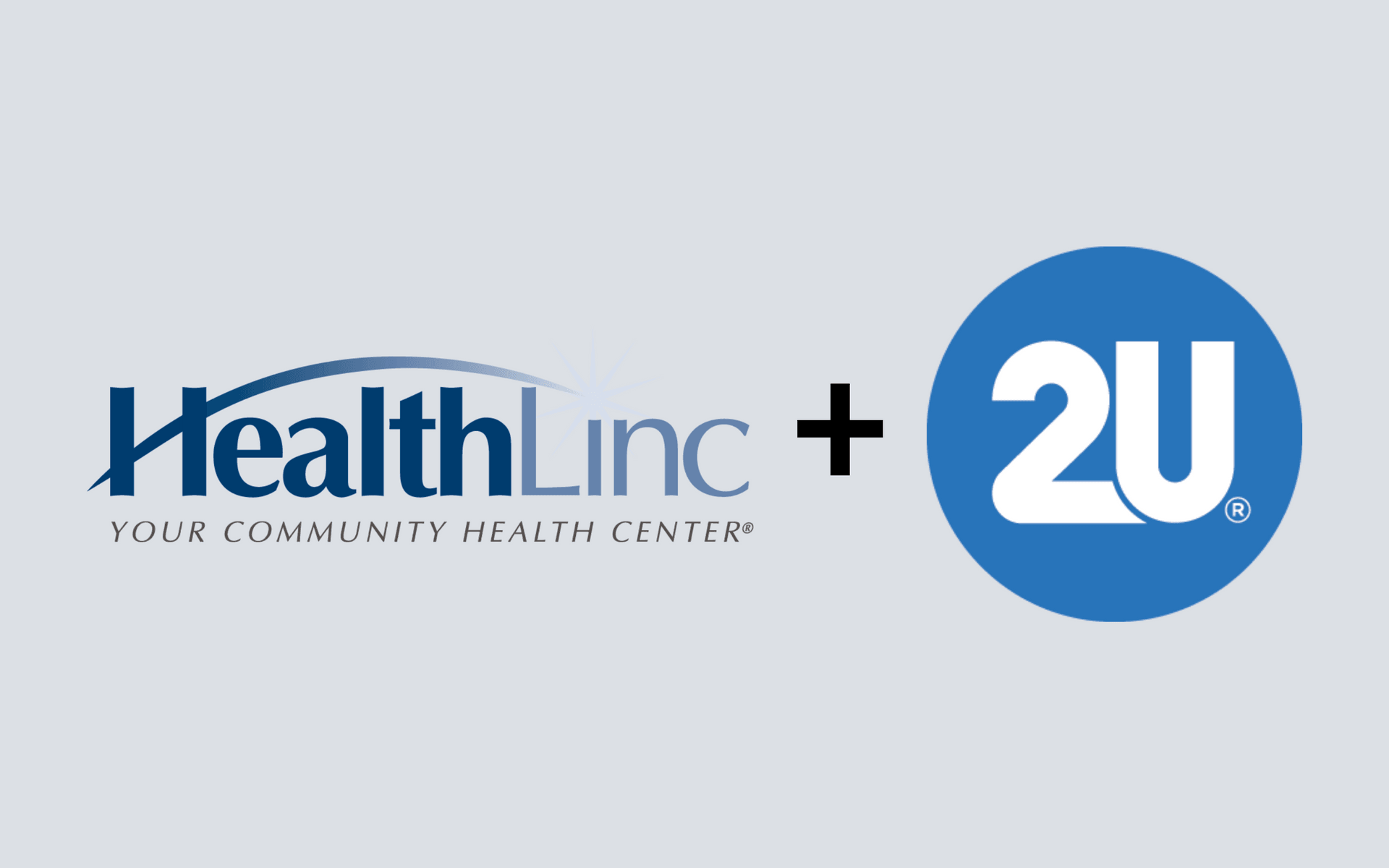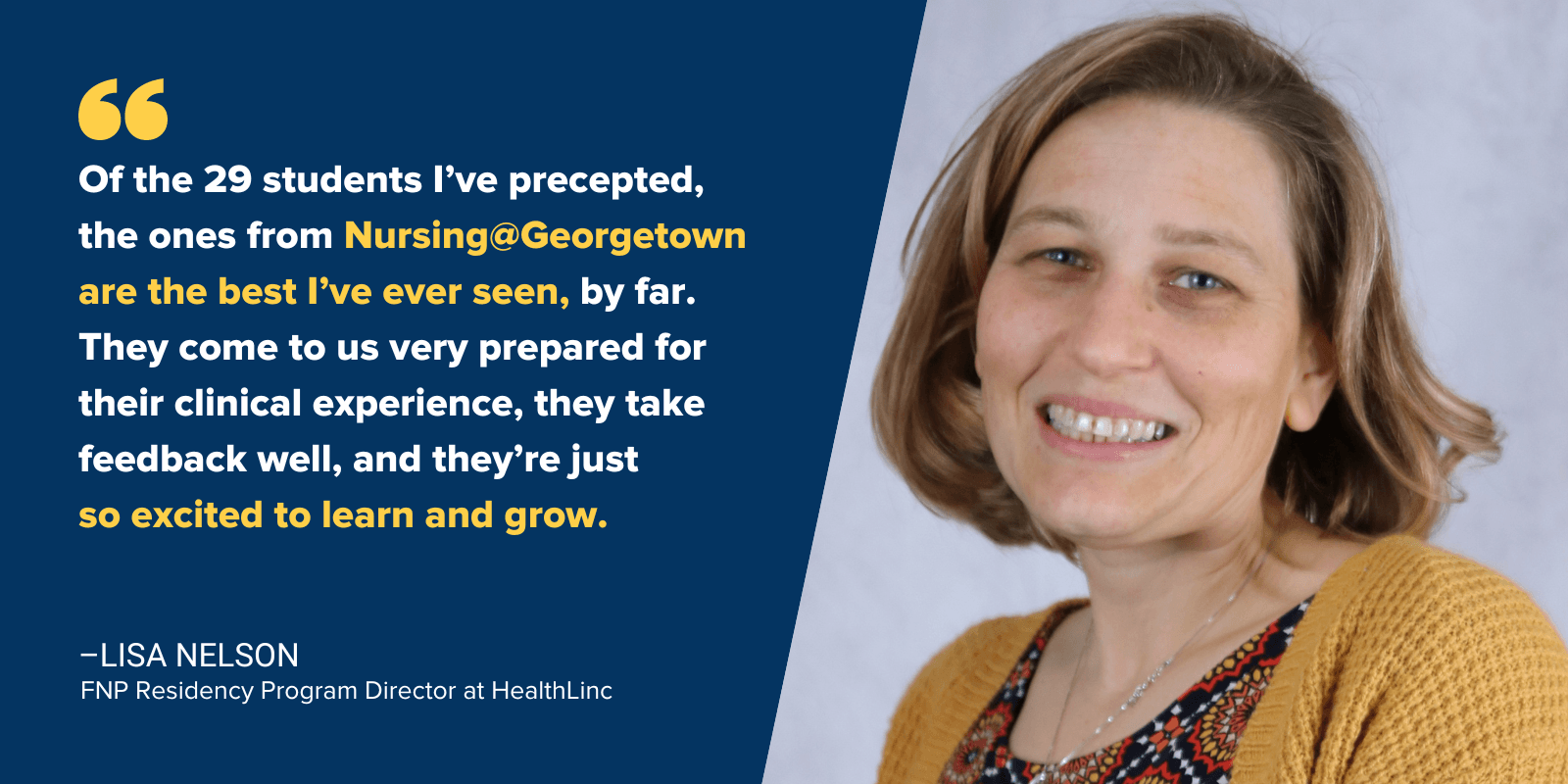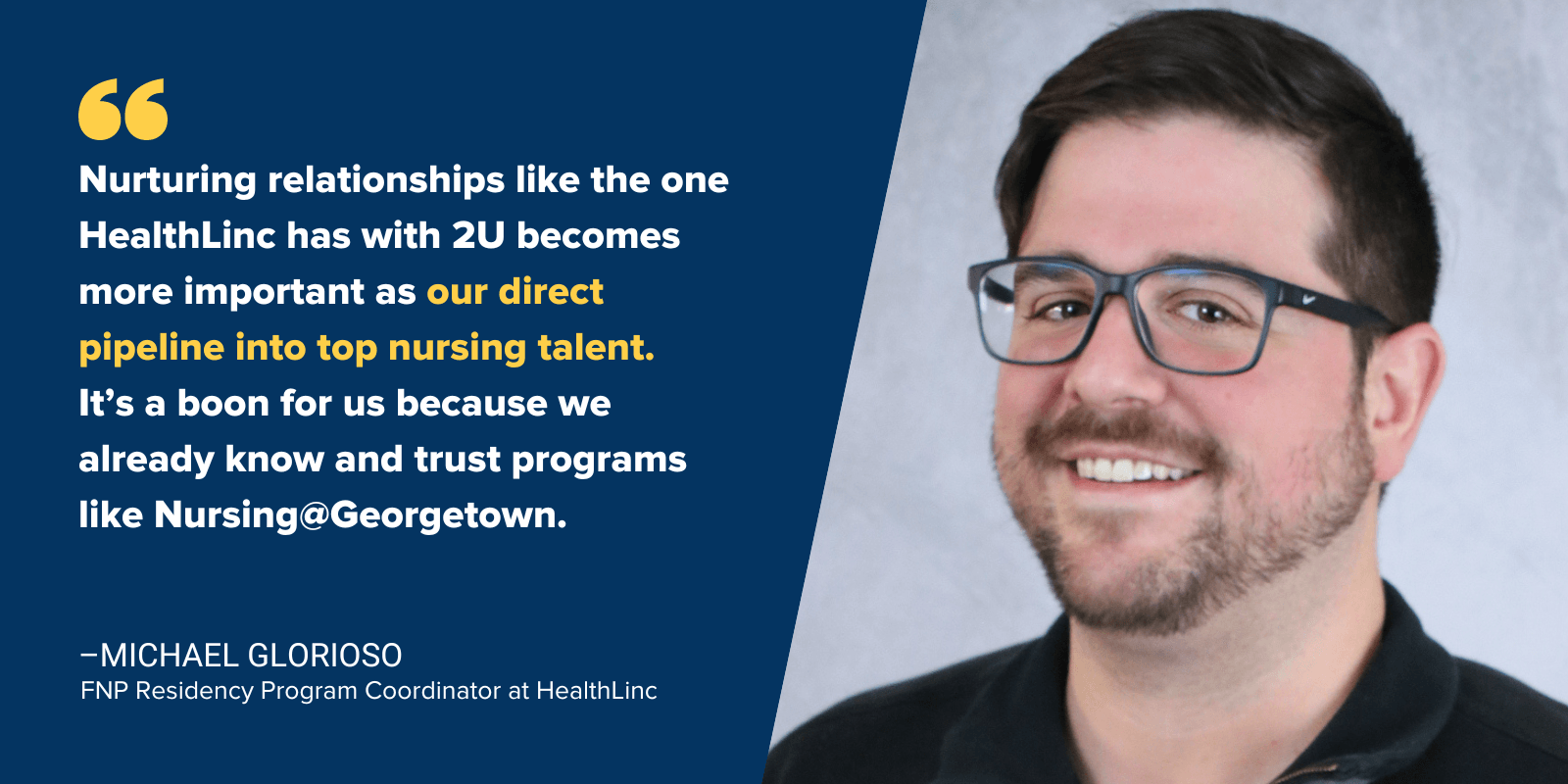Partner Spotlight
How 2U’s Talent Pipeline to Exceptional Nursing Graduates Is Helping HealthLinc Provide Quality Care for All Patients
Written by 2U on Aug 8, 2022
Related content: Strategic Partnerships, Graduate Programs, Impact and Outcomes

With its 12 northern Indiana health centers stretching across the southern arc of Lake Michigan, HealthLinc is a Federally Qualified Health Center (FQHC) serving an expansive range of communities and health complexities. Many of HealthLinc’s patient populations have neither insurance nor the ability to pay for their care, making the organization a critical resource for the historically underserved.
Launched seven years ago, HealthLinc’s Family Nurse Practitioner (FNP) Residency Program has helped the organization continue to fulfill its big-hearted mission and adapt to its patients’ needs. And as you’ll hear shortly, they say some of their most successful FNP residents have come from the 2U-powered online Nursing@Georgetown program. A couple of these residents have even gone on to become full-time HealthLinc employees.
Lisa Nelson, HealthLinc’s FNP Residency Program director and current preceptor, has supervised the learning and growth of five Nursing@Georgetown students in all, through either the residency program or as part of Nursing@Georgetown’s required clinical experiences. We recently spent time with Lisa and Michael Glorioso, HealthLinc’s FNP Residency Program coordinator, to discuss how our exciting new partnership—to strengthen the FNP talent pipeline between the organization and Nursing@Georgetown, and with other 2U-powered program partnerships to come—is such a mutually beneficial opportunity for both the organization and the graduates they hire.
Thanks so much for joining us, Lisa and Michael! We’re curious: What was it about Nursing@Georgetown graduates that initially caught your eye? And how did that lead to the partnership HealthLinc now has with 2U?
Lisa: For me, recognizing the difference that Nursing@Georgetown brings started in my own first year of practice at HealthLinc. I decided to begin precepting that same year, and the first FNP student I supervised came from Nursing@Georgetown. It was such a wonderful experience to be mentoring a student who already had so much confidence—who wasn’t afraid to go into the rooms with patients and who was very respectful and mature in her practice already. Now, she runs a sickle cell clinic for the University of Chicago. Of the 29 students I’ve precepted, the ones from Nursing@Georgetown are some of the best I’ve ever seen, by far. They come to us very prepared for their clinical experience, they take feedback well, and they’re just so excited to learn and grow. At HealthLinc, we treat our patients holistically, well beyond their physical health needs; we understand mental health and social aspects, too. It’s not just about treating someone’s hypertension, but more about how we help them as a human being, and I see that in our Nursing@Georgetown students. They really want to help patients in the same way.
Michael: One of the reasons we're so passionate about our residency program is because there can be a lot of burnout across the nursing practitioner profession in that first year. The residency program gives new FNPs a lot more support and helps build their confidence and hone their skills even more—it’s a safety net versus starting your career and being completely on your own.

Yes, building that bridge seems like it has set both nursing graduates and the organization up for success! In general, what are some of HealthLinc’s greatest current nursing needs and hiring goals—and what are the unique skill sets you’re looking for when it comes to hiring FNPs?
Michael: FNP residency programs are becoming more of a standard in the field, just like with doctors who complete residencies. Of the 50 states in the U.S., only five don’t have one, and that increased market competition means it’s becoming more challenging to recruit great FNPs. I suppose that’s both a good and bad problem for our country to have, right? As an FQHC, HealthLinc’s goal is to find talent who demonstrate a high level of compassion for, and understanding of, the populations we work with. Our FNPs see a wide variety of patients, many with mental health or addiction issues. So candidates really need to understand what they’re getting into with us.
Lisa: You definitely have to have a huge heart for this job and a great desire to give back. I, for one, was part of this same patient population at one point—I grew up in poverty on a farm and was also a teen mom. So I know how vulnerable these people are and how many barriers they have to getting health insurance, accessing the system, and understanding how to take care of themselves. All of these factors mean we also need FNPs with superior critical thinking skills and as much hands-on experience beyond their education program as possible. Some schools are just pushing their students along in their programs, but I don’t think that’s beneficial to the profession. At HealthLinc, we can’t take hours and hours to train our FNPs to know how to balance all those areas, so that real-world experience, which Nursing@Georgetown offers through its clinical placements, is incredibly important.
At 2U, we hear over and over again how critical that hands-on clinical experience is, to complement the quality and rigor of our university partners’ online programs. Speaking of quality, why is providing top-quality healthcare for all, regardless of patients’ circumstances, an integral part of HealthLinc’s mission as an FQHC? And how is having access to the candidate pool from our partners’ nursing programs helping you achieve the impact you wish to make?
Michael: At HealthLinc, we are looking to expand our FNP Residency Program into South Bend soon, so that’s one reason why we’re eager to find the best candidates for our residency program who will also fit the needs of our patient populations. We're training people to help us expand our clinics, hoping they can eventually become preceptors themselves and help with the residency program, work with leadership, assist with advancements, etc. Nurturing relationships like the one HealthLinc has with 2U becomes more important as our direct pipeline into top nursing talent. It��’s a bonus for us because we already know and trust programs like Nursing@Georgetown.
Lisa: It really is phenomenal how many different resources HealthLinc offers our patient communities. For example, we offer a medical legal partnership, have a pharmacist on staff, a behavioral health counselor, community health worker, optometry, dental, you name it. There’s even a bus that goes out into the community to reach patients that can’t come to us otherwise. Hiring graduates who’ll be able to work within this vast range of services, and who can take over our panels of patients and we’ll know they’ll be greatly taken care of, gives me tremendous peace of mind. And that’s actually happening right now with other past residents of the program. Some of my patients come back and ask to be seen by one of them now, and I don’t take offense to that in the least. It just means Nursing@Georgetown has trained its students very well, and our residency program is making them even stronger.

We love how your patients are seeing the results of your hiring and training efforts like this. Focusing on what lies ahead, what do you see the future of education and the nursing profession looking like? And how do you hope and envision our partnership continuing to develop?
Lisa: Well, for one, there may still be this question out there that if an FNP has earned their MSN online, they’re not going to be as qualified as someone who earned it in person. But as someone who did my schooling online—I raised four kids and studied online full-time and worked full time—look where I sit now. I don’t think that difference is going to dictate how you are as a nurse practitioner. It’s the person and the quality of the school or program, not the way the education is delivered. So that’s a stigma we’re going to continue to see our profession breaking down. HealthLinc is also developing additional educational and residency programs for other professions beyond nursing—for medical assistants, dental assistants, social services, pharmacists, family medicine, etc. I see the link we have with 2U helping with many of those fields in the future.
Michael: Yes, it’s so nice to see an agency like ours that’s investing the time and money into its people. As far as what the future holds, with COVID, we’ve learned how to do telehealth even better than before—HealthLinc was actually doing it way before the pandemic forced us to. So I think telehealth will continue to revolutionize care. Our FNPs are also learning more every day, like transgender care and working with the LGBTQIA+ community. HealthLinc offers so much to our staff, giving them ways to keep learning and growing, all in the name of creating healthy communities. That’s the bottom line.
Latest.
Learn more about us.
At 2U, we’re on a mission—to eliminate the back row in higher education and help partners thrive in the digital age. To learn more about who we are and what we do, follow the links below.